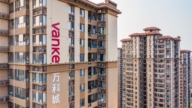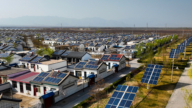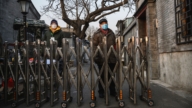【新唐人2014年01月11日讯】最近中国大陆开始推出银行破产条例和存款保险制度,同时还准备试办由纯民资发起的,设立自担风险的民营银行,银行破产也成了大陆金融界的热门话题。经济学家指出,近年来,尽管中共一直不愿意接受国际社会唱衰中国经济的声音,不过,亮丽的数字和天量的货币投放,再也无法抵御经济规律的无情,于是中共政府不愿再为银行坏账兜底,试图断尾求生。
中共银监会日前表示,今年将试办由纯民资发起设立自担风险的银行。不过,中国第一家民营银行—民生银行老板史玉柱,赶紧发微博表示:即将新批的民营银行,都不是全牌照银行,业务范围被控制的很窄,而且运营地域被限制的很小,所以,他认为,现在发起民营银行没啥意思。
而银监会副主席阎庆民日前表示,银监会正在酝酿加快推出银行破产条例,国家不再为储户在商业银行的存款兜底,允许银行破产倒闭,一旦有银行破产,储户的存款将由存款保险机构赔偿,但赔偿有一定限额。
根据目前透露的消息,储户在单个银行的存款,最大赔付额度可能是50万元,超过这一限额的存款部分,将得不到赔偿。
大陆企业评论人士文瑞:“在危机时刻,他们也可能采取断尾巴的模式,断掉这个尾巴,自己求生存,为了把不良资产处理掉,它有可能让它破产,存款大头的损失可能会甩掉它, 把不良资产打包,交给市场去处理掉,实际上也是转化危机,另外一个,从人员方面,它陆陆续续的甩出去。”
去年12月24号,“招商银行”发布公告宣称,“招行”董事会审议通过了《关于授权高级管理层成员批准及签署“生前遗嘱”的议案》,“生前遗嘱”也称为清算计划,目地在于表明如何在不危及金融系统的前提下自我清算。
今年以来,大陆银行业存在已久的问题不断爆发:不良贷款余额和不良贷款率双双上升、持续的钱荒导致利率多次飙升、大量的资金被放贷到房地产行业,和地方政府融资平台推高了房地产泡沫,也使地方债越滚越大成黑洞…….
据中共银监会最新数据显示,截至三季度末,中国商业银行不良贷款余额达到5,636亿元,较年初增加707亿元,而且已连续七个季度呈上升趋势。
中国经济学者邓先生:“现在我们的经济泡沫、房地产泡沫、潜存的经济危机步步来临,而腐败对这个社会的破坏,已经影响到执政基础、人民信任,同时还有环境污染。环境污染和各种原因,将成为一个导火索。”
去年,中国四个一线城市房价涨幅超过20%,还有26个主要城市的涨幅超过10%。而三、四线城市竟出现50多座鬼城。
与此同时,部分城市已经债台高筑。南京银行的研究报告显示,西宁与兰州两地政府发债的“城投债”,去年余额规模与财政收入比,已经超过300%,而伊春、南宁、湖州、南京等城市的比例也都超过100%,镇江、合肥则超过90% 。
大陆金融分析师任中道:“拿一个房地产做例子,房地产泡沫越来越大,它就是完全靠资金在支撑着这个泡沫,一旦很多资金都撤离了,房地产肯定是要崩盘的,房地产一崩,马上就会波及到很大,银行、各个上下游的企业、行业,无论是建材等等,都会波及到。”
与中国经济衰竭伴随而来的是,外资企业纷纷撤离中国,去年5月到7月,就有5家跨国公司撤离中国。新年伊始,法国化妆品公司“欧莱雅”决定,旗下品牌“卡尼尔”撤离中国。在此之前,“欧莱雅”的美国竞争对手“露华浓”,也宣布将撤出中国市场,并缩减1100个工作岗位。
随着“美联储”宣布,从今年1月开始逐渐退出“量化宽松(QE) ”。经济学家们估计,将有更多企业离开中国,使中国经济危机加剧。
采访编辑/刘惠 后制/萧宇
China’s Economic Crisis Intensifies, Are You Ready?
Mainland China recently launched bank bankruptcy rules
and deposit insurance systems.
Meanwhile there are plans to pilot private banks only
funded by private capital.
Bank bankruptcy has become a hot topic in financial sectors.
Economists say although the Chinese Communist Party
(CCP) wouldn’t like to accept the international voice about
China’s economy going down in recent years, the data and
huge money supply can’t stop the economic laws.
The CCP doesn’t want to take care of the bad debts of
Banks, and is trying to find a way out.
The China Banking Regulatory Commission (CBRC)
recently announced that China will pilot private banks
that carry their own risks.
Shi Yuzhu, boss of Minsheng Bank, China’s first private bank,
soon posted on Weibo.
He indicated that new private banks will not be fully licensed,
meaning their business scope will be very narrow.
Even their region of operation will be restricted
to a very small area.
So, he thinks it’s not very meaningful to
launch private banks now.
Vice chairman of CBRC, Yan Qingmin, recently indicated
that the CBRC is accelerating the introduction of bank
bankruptcy rules, meaning the nation will not take care
of commercial banks balances. Banks will go bankrupt.
Deposit insurance companies will cover the losses of
the depositors within limits.
According to current information, depositors can get 500,000
yuan compensation at most for a single account.
Deposits that exceeds the limit will not be compensated.
Wen Duan, mainland industry commentator: “During crises,
they’re likely to take the model of ‘cutting the tail off’, meaning
cutting the dead tail off so the body survives.
In order to get rid of the bad assets, they may let banks go
bankrupt. The major part of the deposit will be got rid of, and
the bad asset will be given to the market.
It’s a way to transfer a crisis. It can also get rid of the staff."
China Merchants Bank announced on December 24 2013
that CMB board passed a proposal after consideration, on
how to do self-clearing under the premise of not putting the
financial system at risk.
Problems that have been seen in mainland banks for
a long time broke out many times this year:
Bad debt balances and NPL ratio have both increased.
Money shortages caused by interest rate hikes.
Large amounts of funds are loaned to real estate industry.
local governments’ financing platforms raised the real estate
bubble, making local debt grow bigger and bigger.
According to the latest data from CBRC, bad debt of Chinese
commercial banks hit 563.6 billion yuan by the third quarter.
This was increasing by 70.7 billion yuan compared
to the beginning of the year.
It’s the 7th quarter that has contuously increased.
Mr. Deng, Chinese economy scholar:"Now we have economy
bubble, real estate bubble, a potential economic crisis coming.
Corruption has damaged the society, ruling foundation,
people’s trust, and the environment.
Environment pollution and all kind of problems
will become a trigger."
The housing prices of four China’s first tier cities raised by
20%,and 26 major cities raised by10%.
But among third and fourth tier cities,
there were 50 ghost cities.
Meanwhile, some cities have very high debt.
A research report by Nanjing Bank shows that governments
of Xining and Lanzhou had city to vote bonds exceeding last
years revenue by 300%;
Yinchun, Nanning, Huzhou, and Nanjing City also exceeded
100%; Zhenjiang and Hefei exceeded 90%.
Ren Zhongdao, mainland financial analyst:
“Let’s take real estate as an example.
The real estate bubble is getting bigger and bigger.
It totally relies on money to support the bubble.
Once the money is withdrawn, the real estate will surely
collapse, and then other industries will be impacted including
banks, downstream businesses, and building materials etc."
Following China’s economic failure,
foreign companies will pull out of China.
Five multinational corporations left China
last year between May to July.
French cosmetics company L’Oreal decided to let its brand
Garnier pull out of China at the beginning of this year.
L’Oreal’s competitor Revlon, an American company, stated
they were pulling out of the Chinese market cutting 1100 jobs.
Federal Reserve announced that the US will gradually pull
back quantitative easing (QE) from this January.
This will make more industries leave China, and intensify
China’s economic crisis, economists say.
Interview & Edit/LiuHui Post-Production/XiaoYu





























